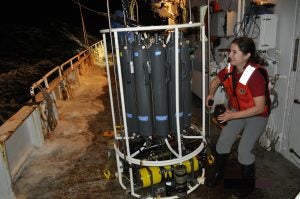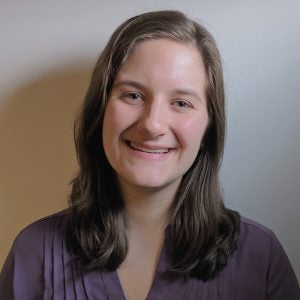May 14, 2020
Welcome to the second in our new series: GSO Profiles! Each post will feature a brief interview with a member of the GSO community. Our first several profiles will be of GSO students who either graduated this past December or will this month. These profiles are one way we can celebrate the accomplishments of those graduating in this unusual time of COVID-19, and also welcome them to the ranks of GSO alumni.
We are continuing our series with Rebecca J. Stevick. She started Ph.D. degree work with GSO Professor Anton Post. After he moved out of state, Rebecca continued her work with Fisheries, Animal and Veterinary Science Professor Marta Gómez-Chiarri as her major professor. The focus for her Ph.D. in Oceanography was biological oceanography. Rebecca grew up in Laurel, Md., a few blocks away from Route 1, did her undergraduate work in bioengineering at the University of Maryland, then moved up to Route 1 in Rhode Island. While working on her degree at GSO, Rebecca also taught and mentored undergraduates and earned a reputation as an outstanding “Outreach Scientist” for the Office of Marine Programs. Having finished her degree last December, Rebecca is now a Postdoctoral Research Fellow at the Genetics of Biofilms Laboratory, Institut Pasteur, in Paris, France
Here’s Rebecca, in her own words:
GSOP: Tell us about your work/research at GSO: what question(s) are you trying to answer?
RJS: My Ph.D. research focused on bacteria in oysters and how they are affected by environmental conditions, added nutrients, disease or probiotics. I am interested in how bacteria contribute to oyster reef resilience and their ability to provide ecosystem services, like nitrogen removal.
GSOP: What is your favorite thing about your work?

RJS: Every day during graduate school is different, whether I’m in the field, at a lab bench or coding on my computer. I enjoy the different people I get to interact with and how much I can learn about anything and everything.
GSOP: What led you to your studies/career in ocean science?
RJS: I’ve always been interested in biology and genetics. Also, I grew up swimming at the beaches in Delaware. When choosing a graduate program, I wanted to apply my biology and engineering skills to an environmental problem with a human aspect. Studying oysters and the coastal environment was a great fit for me.
GSOP: What brought you to GSO?
RJS: The range of expertise and resources meant I would grow as a person and scientist during graduate school. I also knew there was a supportive community that would look out for me. The view of Narragansett Bay from my lab wasn’t so bad either!
GSOP: How have the COVID precautions affected you?
RJS: I recently started a post-doctoral position and had only worked in the lab for 2 weeks before being confined to my apartment. The remote work means I’ve had plenty of time to finish up papers from GSO and help out with ongoing projects back in R.I.
GSOP: Who have been your role models or mentors?
RJS: My advisers and my undergraduate mentees! Both have challenged me to question everything and taught me how to be patient under pressure.
GSOP: What do you do for fun?
RJS: I enjoy travelling, jigsaw puzzles, kayaking, biking, and sleeping on R.I.’s beaches.
GSOP: What is your favorite spot or view at GSO?
RJS: The first-floor balcony of the Coastal Institute Building.

GSOP: What is your advice for someone considering ocean science for their academic/professional career?
RJS: Go for it! Ask everyone you know (and some people you don’t know) for advice and look for opportunities in strange places. Embrace the unknown—there’s still so much we don’t know!
You can find Rebecca on Twitter @rjstevick, LinkedIn, or on her website rebeccastevick.com.
